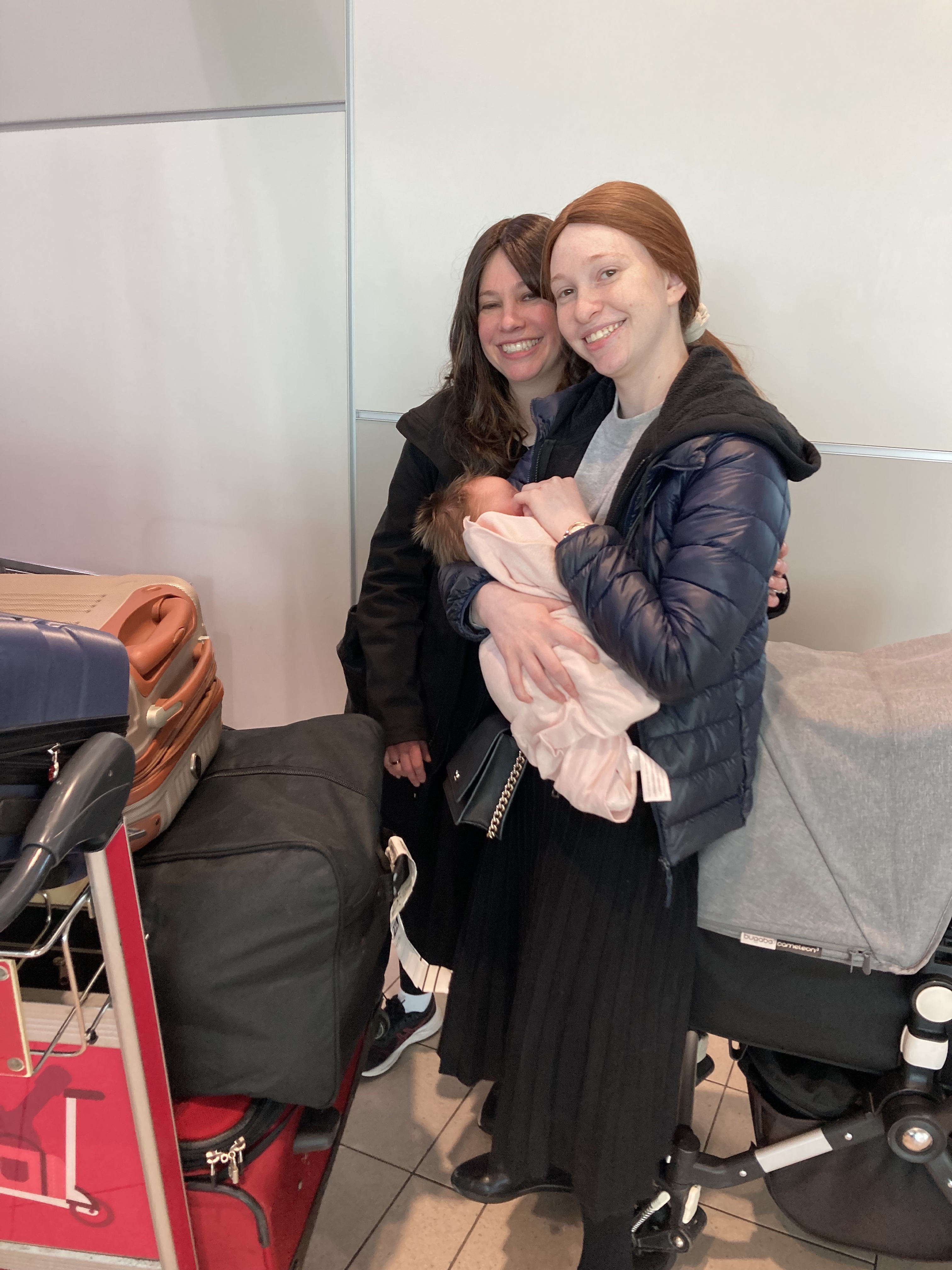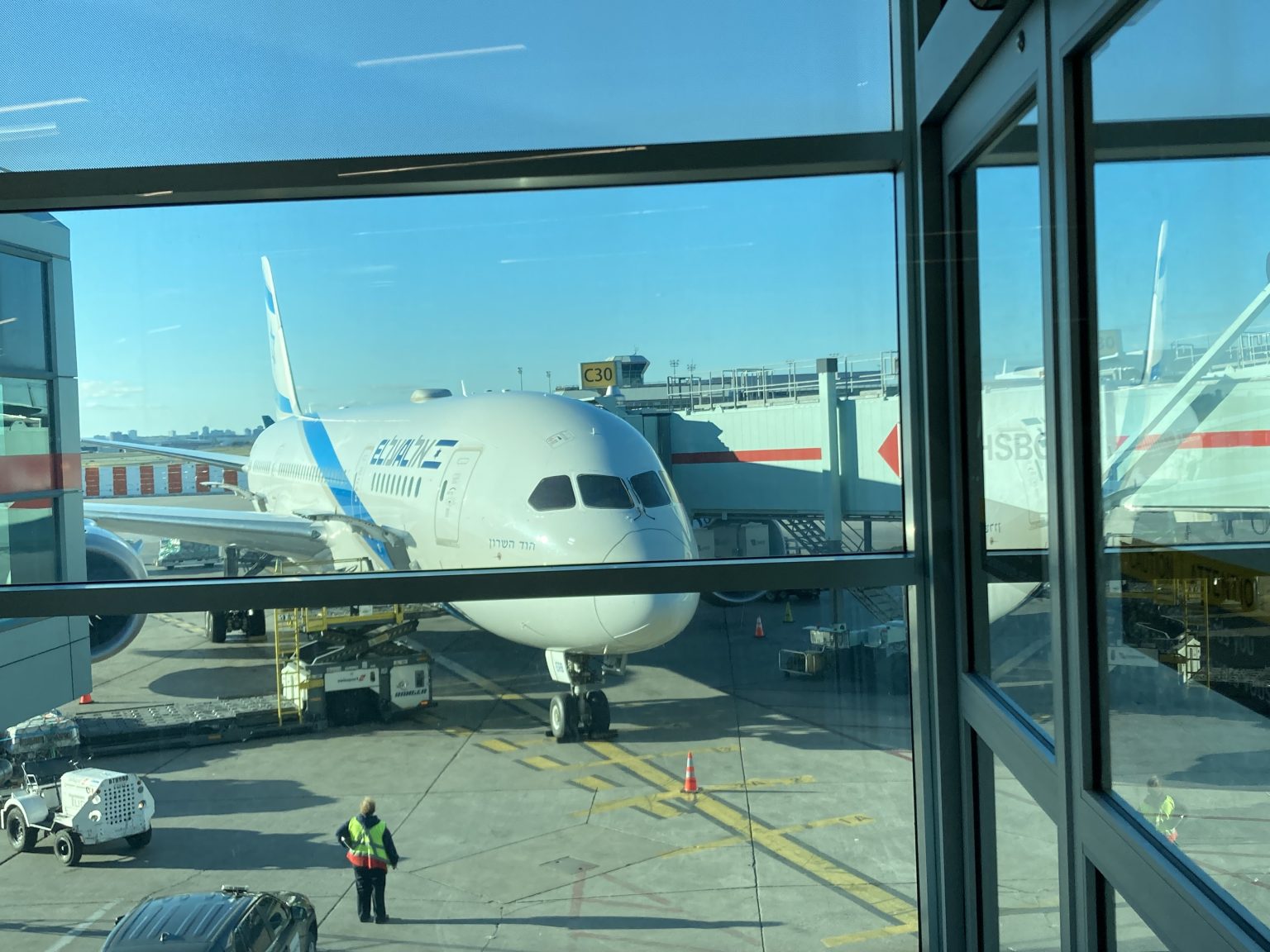When El Al pilots Noam Lowenstein and Asaf Porat made their way into the departure lounge at Toronto’s Pearson International Airport on Thursday, Oct. 27, they probably weren’t expecting their passengers to break out in spontaneous applause.
But that’s what happened as they walked through a gauntlet of travellers holding up their phones to record the flight crew’s arrival at Gate C30 in Terminal 3.
The pilots and flight attendants—and the travellers who were about to board this particular flight to Tel Aviv, knew they were making a bittersweet journey: it was to be the last trip on a route which El Al has been servicing since 1986. (When the airline first came to Canada in 1971, flights were based in Montreal.)
“We tried to approach the management and ask them to reconsider, but we are not the ones who make the decisions,” said Capt. Lowenstein, who has flown in and out of Toronto for more than a half-dozen years.
He revealed that he purposely signed up for this shift so he could pilot the final trip of LY030 out of YYZ. Lowenstein had even prepared some farewell remarks to deliver from the cockpit.
His co-pilot, Asaf Porat, hasn’t flown the route as often, but agreed it was going to be an emotional trip. Then the pair headed for the ramp and onto the Boeing Dreamliner 787 (named “Hod HaSharon”) to prepare for takeoff.

‘Big sadness for all of us’
Israel’s national airline confirmed in June it would be chopping direct service to Toronto, Warsaw and Brussels at the end of October. But the company never fully explained why.
In the weeks leading up to the schedule change, its Toronto staff and Israeli consulate tourism promoters unsuccessfully tried to get El Al to reverse its decision.
After the final flight, El Al’s 20 Canadian office staff, gate agents, and security personnel lost their jobs—although one sales agent may remain employed, said Dinah Reich-Kutner, El Al’s long-time Canadian general manager.
“It is a big sadness for all of us,” she told The CJN, ahead of the last flight, adding that it was “still taking a while for this to sink in.”
While the team didn’t hold a special send off at Pearson, agents handed out El Al souvenirs—like blue water bottles and passport holders—to some of the passengers checking in for the final flight.

Moran Akari of Petach Tikvah, and her parents, of Yokneam, were returning to Israel after visiting her sister in Canada. The Israeli family spends a month together here every year, during the Jewish high holidays.
They heard rumours the decision to shut down the route to Canada had to do with low earnings on carrying cargo, and not because of a lack of paying passengers.
“Every time I fly here, the airplane is packed, like a full flight, so I don’t really know what the reason is,” Akari said.
While the family is resigned to having to change their airline for their next trip, they are worried about Air Canada having a monopoly, and whether that will lead to higher ticket prices.
Handing the market to Air Canada
Israel tourism officials in Canada had said there was good demand for the Tel Aviv-Toronto route before the pandemic hit, with 100,000 passengers flying to Israel from Toronto in 2019. These numbers included large tour groups from both the Jewish market, and from Christian pilgrim communities.
“We had a lot of groups that we had to hand over to the competition,” El Al’s manager Reich-Kutner said, referring to Air Canada now being the only airline to offer direct service to Israel.
Unlike El Al—which operated a couple of direct flights per week in 2022 once travel resumed after the pandemic—the Canadian flag-carrier now runs daily, non-stop service to Tel Aviv to meet demand.
Coincidentally, on the same day as El Al’s final flight departed from Toronto, Air Canada launched a hiring campaign for flight attendants, particularly for applicants who can speak Hebrew, Greek or Thai.

“It makes no sense,” lamented Giovanna Serrao, who has worked as a check-in agent and gate attendant with El Al in Toronto for 23 years.
“So they handed [business] to Air Canada on a golden platter: ‘Here, make money!’ because that’s what they’re doing now.”
Serrao herself was handing out candies and chocolates—along with hugs—as she bid farewell to some of her regular business class and priority frequent fliers. In her two decades of handling passengers, she has met Maccabi basketball players, Hollywood actors, Israeli singers, and the former Israeli president Shimon Peres.
But the passengers whom she loved best are the late Julia Koschitzky and her family: the Toronto philanthropist and community leader volunteered with many Canadian and Israel-based organizations. (Koschitzky died on March 21, 2022.)
‘It’s a shame’: rabbi’s wife

Being on the final flight from Toronto to Tel Aviv felt like coming full circle for Feige Oppenheimer, the rebbetzin of Toronto’s Yavne Zion Synagogue, commonly known as the “Marlee Shul.” She moved to Canada from Israel with her husband, Rabbi Yehudah Oppenheimer, 21 years ago. She was pregnant on that flight.
This was her first trip back to Israel since then.
But this time, she was accompanying that child, now a married woman, her daughter Elisheva, back to the young woman’s home in Jerusalem—with Oppenheimer’s new granddaughter: two-week-old Leah Rivka Janowksi.
Her son-in-law had already flown back to Israel, a few days earlier.
“They came home to have a baby, and he had to go back to yeshiva, but with her baby being so newborn, she couldn’t get a passport for her in time. So we took the first available flight out, and we grabbed this last opportunity,” Oppenheimer said.
Oppenheimer was fully aware that the timing of her trip would mean she could not take a direct return flight back to Canada when her visit in Israel ends. She is coming home via New York—and feeling bittersweet because she doesn’t like stopovers.
‘Quietly down into the night’
Daniel Goldstein was sporting a Toronto Maple Leafs ball cap and a neck pillow as he lined up with his luggage to check in. The former local resident was flying back to Israel alone, to rejoin his wife and four children in their new home in Modi’in—a growing city of mainly North American Orthodox Jewish immigrants between Jerusalem and Tel Aviv.
The Goldsteins made aliyah just three months ago from Toronto. He had come back briefly to help out in the family vinyl window business.
While bringing back a suitcase full of 23 kilograms of Canadian goodies and treats for his family, he was not able to get his hands on any of the free El Al souvenirs. He still hoped there would be some kind of ceremony held when he got on board.
“But you never know. It could just go quietly down into the night.”
Back in the departure lounge, co-pilot Asaf Porat wanted to make sure we knew how attached he and his colleagues are to the Toronto route and to the people.
He cautions that if El Al does eventually decide to reinstate the Canadian city in its North American schedule, the company will face an uphill battle to overcome consumers’ resentment for abandoning them the way it did.
As part of a bailout deal this year with the Israel government, El Al’s owners had to lay off staff and sell a third of the fleet, reducing the number of available planes from 45 to 29, according to reports.
“You always need to work harder to get back something that you gave up,” Porat said. “So if [El Al] finds that this is a good destination to return to, I’m sure they’ll work out winning you back, as it should—being the Jewish airline.”
- The CJN Daily‘s Ellin Bessner was at the airport for the last flight. Hear what that sounded like:
Author

Ellin is a journalist and author who has worked for CTV News, CBC News, The Canadian Press and JazzFM. She authored the book Double Threat: Canadian Jews, the Military and WWII (2019) and contributed to Northern Lights: A Canadian Jewish History (2020). Currently a resident of Richmond Hill, Ont., she is a fan of Outlander, gardening, birdwatching and the Toronto Maple Leafs. Contact her at [email protected].
View all posts








